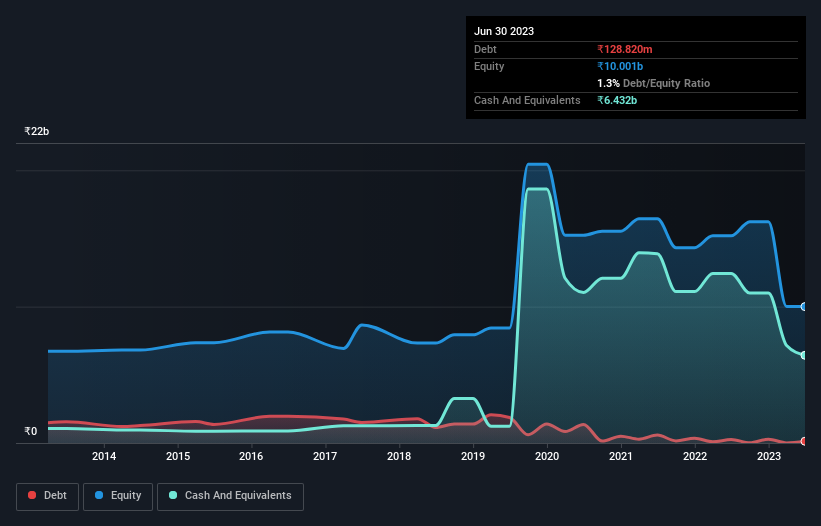Some say volatility, rather than debt, is the best way to think about risk as an investor, but Warren Buffett famously said that 'Volatility is far from synonymous with risk.' So it might be obvious that you need to consider debt, when you think about how risky any given stock is, because too much debt can sink a company. Importantly, NIIT Limited ( NSE:NIITLTD ) does carry debt. But is this debt a concern to shareholders?
Why Does Debt Bring Risk?
Debt assists a business until the business has trouble paying it off, either with new capital or with free cash flow. If things get really bad, the lenders can take control of the business. However, a more common (but still painful) scenario is that it has to raise new equity capital at a low price, thus permanently diluting shareholders. Of course, debt can be an important tool in businesses, particularly capital heavy businesses. The first thing to do when considering how much debt a business uses is to look at its cash and debt together.
Check out our latest analysis for NIIT
What Is NIIT's Net Debt?
As you can see below, NIIT had ₹128.8m of debt at March 2023, down from ₹252.3m a year prior. However, its balance sheet shows it holds ₹6.43b in cash, so it actually has ₹6.30b net cash.

A Look At NIIT's Liabilities
According to the last reported balance sheet, NIIT had liabilities of ₹1.30b due within 12 months, and liabilities of ₹96.9m due beyond 12 months. Offsetting these obligations, it had cash of ₹6.43b as well as receivables valued at ₹800.4m due within 12 months. So it actually has ₹5.83b more liquid assets than total liabilities.
This luscious liquidity implies that NIIT's balance sheet is sturdy like a giant sequoia tree. With this in mind one could posit that its balance sheet means the company is able to handle some adversity. Simply put, the fact that NIIT has more cash than debt is arguably a good indication that it can manage its debt safely. When analysing debt levels, the balance sheet is the obvious place to start. But it is future earnings, more than anything, that will determine NIIT's ability to maintain a healthy balance sheet going forward. So if you want to see what the professionals think, you might find this free report on analyst profit forecasts to be interesting.
So How Risky Is NIIT?
While NIIT lost money on an earnings before interest and tax (EBIT) level, it actually booked a paper profit of ₹131m. So when you consider it has net cash, along with the statutory profit, the stock probably isn't as risky as it might seem, at least in the short term. We'll feel more comfortable with the stock once EBIT is positive a feat the company is likely strategically repositioning for, given they recently demerged the Corporate Learning Business which contributed over 80% of the revenue last year. The balance sheet is clearly the area to focus on when you are analysing debt. However, not all investment risk resides within the balance sheet - far from it. To that end, you should be aware of the 1 warning sign we've spotted with NIIT .
If, after all that, you're more interested in a fast growing company with a rock-solid balance sheet, then check out our list of net cash growth stocks without delay.
Valuation is complex, but we're here to simplify it.
Discover if NIIT might be undervalued or overvalued with our detailed analysis, featuring fair value estimates, potential risks, dividends, insider trades, and its financial condition.
Access Free AnalysisHave feedback on this article? Concerned about the content? Get in touch with us directly. Alternatively, email editorial-team (at) simplywallst.com.
This article by Simply Wall St is general in nature. We provide commentary based on historical data and analyst forecasts only using an unbiased methodology and our articles are not intended to be financial advice. It does not constitute a recommendation to buy or sell any stock, and does not take account of your objectives, or your financial situation. We aim to bring you long-term focused analysis driven by fundamental data. Note that our analysis may not factor in the latest price-sensitive company announcements or qualitative material. Simply Wall St has no position in any stocks mentioned.
About NSEI:NIITLTD
NIIT
Engages in providing learning and knowledge solutions to individuals, enterprises, and various institutions internationally.
Excellent balance sheet with reasonable growth potential.
Market Insights
Community Narratives




